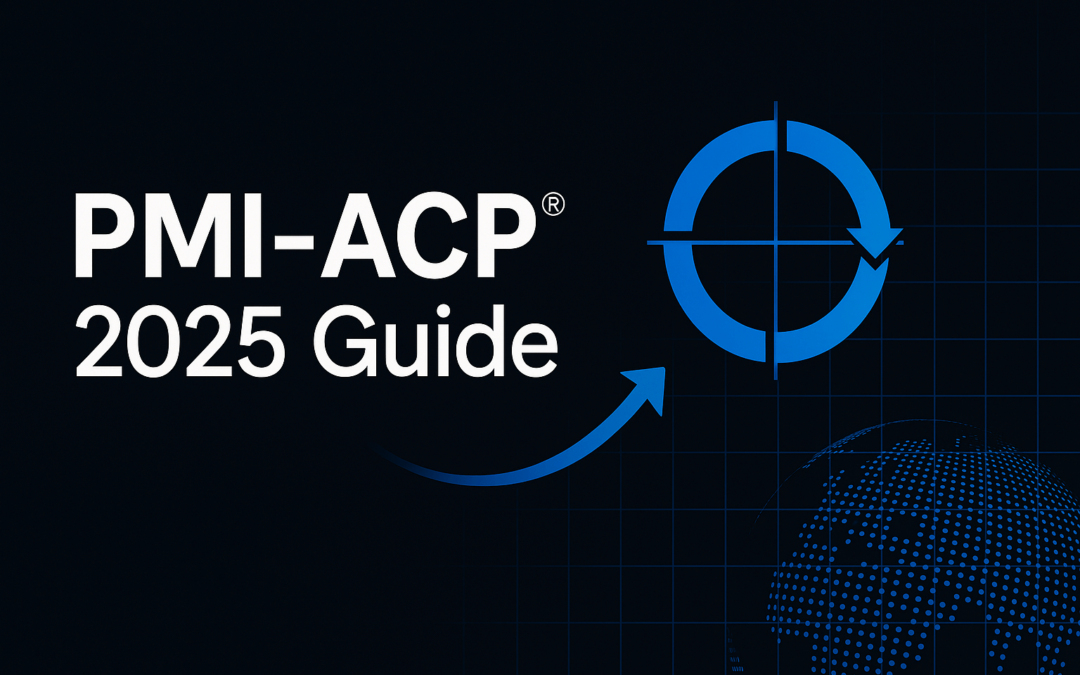Who this is for: Corporate L&D leaders, PMO heads, and project managers who need credible, current guidance on the PMI-ACP®—without fluff.
Table of Contents
Fast Summary (read this first)
-
What changed: PMI updated the PMI-ACP Exam Content Outline (ECO) in late 2024. The blueprint now has four domains: Mindset (28%), Leadership (25%), Product (19%), and Delivery (28%).
-
Format (unchanged): 120 questions in 180 minutes, available in multiple languages.
-
Eligibility (updated): Secondary degree + 24 months of agile experience in the last 5 years + 28 hours of agile training (PMI now states 28 hours, not 21). Project Management Institute
-
Renewal: 30 PDUs every 3 years under PMI’s CCR program. Agile ACP
-
Why it matters: Agile is mainstream—~70% of organizations report using agile in their SDLC and ~42% use hybrid models. Your buyers and stakeholders expect agile literacy.
The Executive Case for PMI-ACP® (and why it’s different from PMP®)
Most enterprises now run hybrid delivery—a blend of predictive, agile, and DevOps. The PMI-ACP validates practical agility across frameworks (Scrum, Kanban, Lean, XP), not allegiance to one school. It complements PMP rather than competing with it:
-
PMP® signals broad mastery of project delivery (predictive ↔ hybrid ↔ agile) with a heavy focus on decision-making under uncertainty at scale.
-
PMI-ACP® signals hands-on agile competency: iterative planning, product/value thinking, team facilitation, stakeholder co-creation, and continuous delivery.
Agile is not fringe. The latest State of Agile shows ~70% using agile in the SDLC and ~42% using hybrid models—so procurement teams increasingly demand agile-literate project leaders.
The 2025 Exam: What’s Actually Tested
Domain
Mindset
Leadership
Product
Delivery
Weights
28%
25%
19%
28%
What’s It Check
Agile principles, empiricism, psychological safety
Servant leadership, facilitation, stakeholder alignment
Value definition, backlog strategy, discovery vs delivery
Iterative planning, flow metrics, quality, risk/dependencies
Format: 120 questions, 180 minutes. Scenario-heavy, practical judgment.
Eligibility & Application
You need:
-
Secondary degree (or global equivalent)
-
24 months of agile experience in the last 5 years
-
28 hours of agile training (PMI or third-party)
Process: Create PMI account → submit application → (audit if selected) → pay & schedule (1-year eligibility; up to 3 attempts).
Costs & Membership (quick view)
-
Exam fees (commonly referenced): US$495 non-member; US$435 member.
-
PMI membership: typically US$129 + US$10 application.
Confirm localized pricing at checkout; PMI updates fees periodically.
Keep It Current: PDUs
Renew every 3 years with 30 PDUs (education + optional giving back). Align learning with real initiatives: flow analytics, product discovery, facilitation.
How to Prep (smart and lean)
1) Map study to the blueprint
Mindset & Leadership first (teams and stakeholders), then Product and Delivery (value + flow).
2) Practice like production
Timed mocks (120 items); debrief the why. Add labs: backlog slicing, cycle time/throughput, stakeholder role-plays.
3) Team-based acceleration (corporates)
Run a 3-week bootcamp:
-
Week 1: Mindset & Leadership (working agreements, facilitation)
-
Week 2: Product (value slicing, outcome mapping)
-
Week 3: Delivery (flow metrics, forecasting) + full mock & debrief
PMI-ACP® vs PMP® (at a glance)
Aspect
Focus
Exam
Best for
Signal
PMI ACP
Applied agile across frameworks
120 Qs / 180 mins
Product & team agility
Practical value & flow
PMP
End-to-end delivery leadership
180 Qs / 230 mins
Cross-project/portfolio leadership
Strategic delivery judgment
What Buyers Should Measure Post-Training
-
Lead/cycle time trends
-
Throughput stability with controlled WIP
-
Escaped defects reduction
-
Outcome metrics (activation, NPS, renewal)
Tie sponsorship to operational improvements, not just pass rates.
FAQs
1) Is PMI-ACP harder than PMP?
Different focus. PMP is broader and longer; ACP is shorter and tests applied agile judgment. Many agile practitioners find ACP more intuitive.
2) How many training hours do I need?
28 hours of agile-focused training.
3) How long is PMI-ACP valid?
3 years; renew with 30 PDUs per cycle.
4) What does the exam cover?
Four domains: Mindset, Leadership, Product, Delivery (weighted above).
5) Is agile still relevant outside software?
Yes—agile/hybrid practices are widely used across services, the public sector, and product organizations.
Conclusion & CTA
PMI-ACP® signals real delivery maturity in hybrid organizations—mindset, leadership, product thinking, and flow-based execution. Adopt a focused, lab-driven study plan, measure operational outcomes, and scale what works.
Follow PM Training School on LinkedIn for more insights on project management and corporate training.



Recent Comments